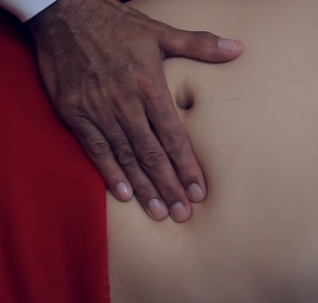The spleen is a part of the lymphatic system that is situated in the upper left section of the abdomen and guarded by the rib cage. It performs a host of functions, including draining worn out or damaged RBCs and infection causing matter as well as fighting particular bacteria types that cause pneumonia and meningitis. Spleen pain can occur due to a variety of reasons, including spleen enlargement.
Spleen Pain – Location
Spleen pain may occur as a dull pain in the middle or upper section of the back, and may restrict to the upper left abdominal area. The pain can sometimes spread to other areas and lead to pain that radiates. Such pain can cause chest pain and abdominal pain which is similar to one that is felt when the bowels, bladder, or stomach are full.
Treatment is dependent on the underlying cause and involves surgical and non-surgical options.
Symptoms accompanying spleen pain
Some of the signs and symptoms and associated health complications that may accompany spleen pain are listed below:
- An enlarged spleen may result in feeling of fullness or a full stomach even after the intake of small meals. This generally occurs because the enlarged spleen tends to exert pressure on the stomach which can lead to significant loss of appetite.
- The upper left section of the abdomen may be somewhat swollen and tender to touch. This is especially the case if the enlarged spleen has ruptured.
- Spleen enlargement associated chest pain may sometimes occur with shoulder pain. Subsequently, the lungs may be under increased during respiration and rib movements, thereby causing the area to become tender.
- The spleen is an important part of the immune system. Hence, spleen pain and associated dysfunction of the organ can increase the vulnerability to developing infections. Hence, patients need to be extra careful to avoid infections, take antibiotics as and when needed, and have important vaccinations.
- Spleen pain during pregnancy can be a sign of some extreme infection which can be dangerous for both the unborn child and the mother. Patients need to seek immediate medical care.
- The platelet count gets significantly reduced due to spleen problems. This can cause easy bleeding and bruising. Consequently, the excess loss of RBCs and WBCs from the body weakens the immune system and triggers varied conditions, including anemia and low blood pressure, etc.
- A ruptured spleen can cause internal bleeding in the abdomen. It can cause intense spleen pain and life-threatening blood pressure fluctuations. Such a complication needs emergency medical care.
- Other symptoms include chills, sudden weight loss, fever, fatigue, night sweats, restlessness, irritability, and jaundice.
Causes of spleen pain
Some of the common causes of spleen enlargement and spleen pain are listed below:
- Syphilis, a persistent and prolonged bacterial infection which is typically transmitted via unsafe sexual intercourse.
- Mononucleosis, a viral infection marked by excessive levels mononuclear monocytes in blood, fever, and swelling of lymph nodes.
- Endocarditis, inflammation of the heart valves and the cardiac inner lining.
- Liver cirrhosis, a persistent degenerative disease which causes extensive liver damage and replaces the normal cells of the organ with scar tissue.
- Toxoplasmosis, a parasitic infection wherein the pathogen ‘Toxoplasma gondii’ gets transferred from infected cats.
- Leukemia, a progressive malignant condition that affects the WBCs.
- Hodgkin’s disease, a type of lymphoma and a cancerous but usually curable disease which causes progressive enlargement of the liver, spleen, and lymph tissues.
- Portal hypertension, a condition marked by dangerous elevation in blood pressure. It occurs due to alcoholic liver cirrhosis that causes blockage, spleen enlargement and spleen pain, and collateral veins.
- Niemann-Pick Disease, a hereditary metabolic condition that affects lipid metamorphosis and causes gastrointestinal issues and enlargement of organs that form blood. The condition is passed on as an autosomal recessive trait.
- Amyloidosis, a progressive incurable disease of metabolism that is marked by abnormal accumulation of protein deposits in varied tissues and organs.
- Gaucher’s Disease, a rare genetic metabolic condition marked by cerebrosides or fatty molecules buildup in organs like the bones, spleen, liver, and the central nervous system.
- Rheumatoid arthritis, a progressive acute autoimmune disorder marked by joint inflammation and deformities.
- Cystic fibrosis, a genetic disease that affects the lungs, digestive system, the sweat glands, and especially the pancreas which develops fibrous scar tissue.
- Biliary atresia, a condition marked by blockages of the ducts that transfer bile from the liver for storage in the gallbladder.
- Felty syndrome, a disorder characterized by dangerously low WBC count, spleen enlargement and spleen pain, and rheumatoid arthritis.
- Sclerosing cholangitis, a persistent liver illness marked by scarring, thickening, obstructions, and inflammation of eth bile ducts that occur outside and within the liver.
- Varied blood disorders like AIHA/Idiopathic Autoimmune Hemolytic Anemia, MDS/Myelodysplastic Syndrome, hemoglobinopathies, and PV/Polycythemia Vera.
- Other uncommon conditions that cause spleen enlargement and spleen pain include cyst or abscess near the spleen; injury or physical damage to the spleen; excessive pressure on liver or the lymphatic vessels; and malaria.

